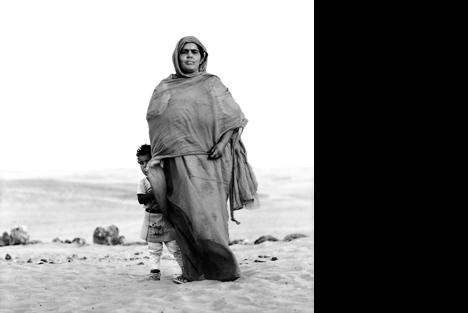THE TREBLE CLEF



By Wilfredo José Burgos Matos, Ph.D.

Inthevast,wind-sweptexpansesofthewesternSahara,where sandmeetsskyinadanceasancientastimeitself,livesapeople whosehistoryandidentityarestitchedintotheveryfabricoftheir music:theSahrawis.TheSahrawipeoplehaveenduredpolitical displacementandculturalerasurefordecades,yettheirhistory, culture,andmusicstandasasonicarchiveofresistance,hope, andmemory.Fromtherhythmicpulseoftbaldrumstothepoetic versesofhaulmusic,everynotecarriestheweightofapeople's longingforhome.TheSahrawisareindigenoustoWestern Sahara,aregionborderedbyMorocco,Mauritania,andAlgeria. Traditionallynomadic, PhotobyMicheleCureltakenin2020 afterMorocco’scease-fireviolation.

Inthelate19thandearly20thcenturies,WesternSaharafellunder Spanishcolonialrule,knownasSpanishSahara.However,asSpain withdrewin1975,MoroccoandMauritaniaclaimedtheterritory, sparkingaprotractedconflictthatpersiststothisday.TheSahrawi ArabDemocraticRepublic(SADR),proclaimedbythePolisario Front,seeksindependence,butmostofWesternSahararemains underMoroccancontrol.
BothpoliticalandeconomicinterestshavedrivenMorocco's occupation.WesternSaharaisrichinphosphates—akey ingredientinfertilizers anditscoastalwatersareabundantinfish stocks,makingtheterritoryhighlydesirable.Additionally,the potentialforoffshoreoilandgasreserveshasonlyheightened internationalinterestintheregion,furthercomplicatingefforts towardapeacefulresolution.Thesegeopoliticaldynamicsare sustainedbyglobalpowersthat,whilepubliclysupportinghuman rights,oftenprioritizeeconomicandstrategicalliances.Several countrieshavebackedMorocco’sclaimsinexchangefortrade agreements,militarycooperation,oraccesstoresources,leaving theSahrawipeopleinastateoflimbowithouttheabilityto theirrootstracebacktoBerber,Arab,andsub-SaharanAfrican lineages,formingaculturalmosaicthatreflectscenturiesof migrationandexchangeacrossthedesert.
exercisetheirrighttoself-determinationfully.TheUnitedNations continuestorecognizeWesternSaharaasanon-self-governing territory,andtheSADR,declaredbythePolisarioFrontin1976,is recognizedbyover40countriesworldwide.However,withoutmore decisiveinternationalinterventionandaresolutiontoresource exploitation,theSahrawistruggleforsovereigntyremains entangledinbroadergeopoliticalintereststhatovershadowtheir questforjustice.

Still from Polisario, un people en armes, documentary in favor of Sahrawis’ self-determination, 1978.
ThisunresolvedconflicthasdisplacedthousandsofSahrawisto refugeecampsinTindouf,Algeria,wheregenerationshavegrown upamidtheuncertaintyofstatelessness.Andyet,itishere,inexile, thattheirculturalidentityhasremainedvibrant,keptalivethrough stories,traditions,andmostpowerfully,music.
In2017,aspartofourMulticulturalMusicEncountersseries,we dedicatedaspecialprogramtotheSahrawipeopleunderthe themeTheForgottenPeople:TheSahrawis.Throughthisinitiative, weexploredtherichmusicaltraditions,culturalresilience,and ongoingstruggleforself-determinationoftheSahrawicommunity, whosevoicesaretoooftenoverlookedontheworldstage.The programinvitedaudiencestoengagewiththepowerfulrhythms andpoeticexpressionsthatdefinetheirhistory,identity,andthe enduringspiritoftheirpeople.

ThesoulofSahrawimusicishaul,agenrethatisasmuchasocial institutionasitisanartform.EmergingfromthefusionofBerber, Arab,andAfricantraditions,haulischaracterizedbyitsmodal scales,rhythmiccomplexity,andlyricalfocusonthemesoflove, exile,resistance,andspiritualreflection.Inhaul,menandwomen oftenalternateinperformance,withthetbal(alargehanddrum) andthetidinit(atypeoflute)layingtherhythmicandmelodic foundation.Thevocallines,oftenimprovised,carrytheemotional core,weavingpoeticnarrativesthathonorthepastwhile expressingtheongoingstruggleforself-determination.
OneofthemostcelebratedcontemporarySahrawimusicianswas MariemHassan.Knownasthe"VoiceoftheSahara,"Hassan transformedhaulmusicintoagloballanguageofresistance, performingacrosstheworldwhilecarryingtheSahrawicauseto internationalaudiences.Hersongsblendthetraditionalwiththe contemporary,layeringelectricguitarsovertidinitmelodies,and herlyricsresonatewithlongingforahomelandmanyofher listenershaveneverseen.Throughthisblend,Hassancreateda soundscapethatresonatedfarbeyondthebordersofher homeland,givingvoicetothestrugglesandhopesofherpeople. HerartistrydidnotmerelypreserveSahrawimusicaltraditions—it revitalizedthem,positioningthemontheglobalstageasaformof culturalresistanceagainstoccupationanderasure.Hassan’swork isinseparablefromthepoliticalnarrativeofWesternSahara,using melodyandpoetrytotellstoriesofexile,resistance,andresilience.
Analytically,Hassan'slyricsreflectaprofoundpolitical consciousness,drawingfromSahrawioralpoetrythatcritiques coloniallegacies,Moroccanoccupation,andthesufferingenduredin refugeecamps.Inherpowerfulanthem“L’Intifada,”shesings: “Intifada,intifada,/SonsoftheSaharariseup,/Shakeoffthedustof oppression,/Lettheworldhearyourvoice.”Theselinesfunctionas bothacalltoactionandadocumentationoftheSahrawipeople's uprisingsagainstMoroccanrule,turningmusicintoavehiclefor mobilizationandhistoricaltestimony.Yet,evenassheconfronts politicaloppression,hermusicalsoexploresthemesoflonging, identity,andculturalpride,offeringanuancedportrayalofSahrawi lifebeyondvictimhood.Thisbalancebetweenpoliticalurgencyand culturalaffirmationunderscoresHassan’srolenotonlyasanartist butasaculturalambassador,ensuringthattheSahrawinarrative remainsvisibleinglobaldiscoursesaboutjustice,humanrights,and decolonization.
Furthermore,MariemHassan'scollaborationswithinternational musiciansandherparticipationinglobalmusicfestivalsexpandedthe reachofSahrawimusic,forgingsolidaritynetworksacrosscontinents. Her2010albumShoukaisamasterfulexampleofthistransnational dialogue,withitstitletrackdirectlyrespondingtoaspeechby MoroccanKingHassanII,challengingthenarrativeofMoroccan sovereigntyoverWesternSahara.In“Shouka”(TheThorn),Hassan sings:“Theygaveuspromises,/Emptywordslikethedesertwind./But wecarryourthorn,/Areminderwehavenotforgotten,/Ourland,our right,ourhome.”Thesewordspoignantlyrejectpoliticalmanipulation whileassertingtheSahrawipeople'sunwaveringconnectiontotheir land.Thealbumcombinestraditionalhaulrhythmswithelectricguitar andWesternharmonies,symbolicallybridgingSahrawiheritagewith globalmusictrends.Throughsuchartisticchoices,Hassanamplified theSahrawistrugglewithininternationalspaces,challenginglisteners toconfronttherealitiesofoccupationwhilecelebratingthecultural vitalityofherpeople.Herlegacycontinuestoinspireartistsand activistsalike,demonstratingthepowerofmusicasamediumfor resistance,storytelling,andglobalsolidarity.
TheLimitsofPoliticalChange:MusicandthePlightsoftheMiddle East
MusicfromtheMiddleEasthaslongbeenapowerfultoolforpolitical expressionandsocialchange,oftenemergingasavoiceforthe oppressedandacatalystforcollectiveaction.Onenotableexampleis theuseofprotestsongsduringtheArabSpringuprisingsintheearly 2010s.IncountrieslikeTunisiaandEgypt,musicianssuchasElGeneral (Tunisia)andRamyEssam(Egypt)becamesymbolsofresistance.El General’ssongRaisLebled,whichcriticizedgovernmentcorruption andoppression,wentviralonsocialmediaandwaswidelycredited withfuelingproteststhateventuallyledtothefallofTunisianPresident ZineElAbidineBenAli.Similarly,RamyEssam’sIrhal(“Leave”),adirect callfortheresignationofEgyptianPresidentHosniMubarak,became anantheminCairo’sTahrirSquareandwaschantedbythousandsof demonstrators.Thesesongsgavevoicetowidespreadgrievancesand helpedunifyprotestersaroundasharedmessageofchange.
YettherelationshipbetweenmusicandpoliticalpowerintheMiddle EastdidnotbeginwiththeArabSpring.Decadesearlier,thelegendary EgyptiansingerUmmKulthumcaptivatedaudiencesacrosstheArab worldwithherdeeplypoeticlyricsandemotivevocaldelivery.Known as"theStaroftheEast,"UmmKulthum’smonthlylivebroadcasts broughtcitiestoastandstillandunitedlistenersacrossclassand nationalboundaries.Hersongs,manywrittenbyprominentpoets, articulatedthemesoflove,loss,andpatriotism,resonatingwith millionsduringkeymomentsofArabnationalism,especiallyunder GamalAbdelNasser’sleadership.InsongslikeWallāhiZamān,Yā Silāḥī("It'sBeenaLongTime,OhWeaponofMine"),whichbecamethe officialanthemofEgyptduringNasser’sera,hervoiceembodiedboth thecollectivelongingandthepoliticalaspirationsofaregionin transformation.Herabilitytostiremotionalandnationalpride demonstrateshowpoeticmelody,evenwithoutovertprotest,can becomeaforceofculturalandpoliticalmobilization.
Beyonddirectprotest,MiddleEasternmusichasalsoplayeda subtleryetsignificantroleinshapingpoliticaldiscourse.InIran,for instance,undergroundmusicianshavechallengedstate-imposed culturalrestrictionsandadvocatedforfreedomofexpression. ArtistslikeMohsenNamjoohaveusedafusionoftraditionalPersian musicandmodernstylestocriticizetheregimeandquestionsocial norms.Despitecensorship,theirworkcirculatesonlineand resonateswithayoungergenerationseekingreform.Thisblendof heritageandrebellionunderscoreshowmusicintheMiddleEast notonlyreflectspoliticalrealitiesbutalsoinspiresnewpossibilities fordialogueandtransformation,oftenatgreatpersonalrisktothe artiststhemselves.
Whilemusichasbeenapowerfulforceforpoliticalchangeinparts oftheMiddleEastandNorthAfrica,notallmusicalexpressionshave yieldedsignificantpoliticaloutcomes;WesternSahara'sSahrawi musicisapoignantexample.Despiteitsdeepemotionaland culturalresonance,Sahrawimusichaslargelyfailedtocatalyze politicaltransformationorinternationalaction.Therearemany reasonsrelatedtothis.Oneisthelimitedglobalvisibilityand geopoliticalmarginalizationoftheSahrawistruggle.TheWestern Saharaconflict,involvingMorocco’scontestedclaimoverthe territory,remainsunresolved,andtheSahrawipeople’scallsfor self-determinationareoftenovershadowedinglobaldiscourse.
MusicbySahrawiartistslikeMariemHassan,althoughrichinprotest andidentity,hasremainedlargelyconfinedtonicheaudiences withouttheviralreachormassmobilizationpowerseeninother movementsliketheArabSpring.
Anotherfactoristhelackofaunifiedorwidespreadpolitical movementwithintheregionitselfthatcanamplifythemusic's message.TheSahrawipeoplearedispersed,manylivinginrefugee campsinAlgeria,withlimitedaccesstomediainfrastructurethat couldprojecttheirculturalresistanceonalargerscale.Additionally, theMoroccanstatetightlycontrolsnarrativeswithintheWestern Sahara,restrictingfreedomofexpressionandsuppressingdissenting voices,includingmusic.Withoutabroaderecosystemofresistanceor internationalalliespushingforchange,Sahrawimusic,despiteits deliberatecallsforjustice,remainsaformofculturalpreservationand personaltestimonyratherthanadriverofpoliticalupheaval.
AsofApril2025,theSahrawipeoplecontinuetofaceaprotractedand unresolvedstruggleforself-determination.The1991UN-brokered ceasefirebetweenMoroccoandthePolisarioFrontcollapsedin2020, leadingtorenewedlow-intensityhostilitiesalongtheMoroccan-built bermthatdividesWesternSahara.Despiteinternationalefforts, includingproposalsforpartitioningtheterritory,bothMoroccoandthe PolisarioFronthaveshownlittlewillingnesstocompromise,resultingin apersistentstalemateandongoingtensionsintheregion.
Approximately170,000Sahrawirefugeesremainincampsaround Tindouf,Algeria,makingitoneoftheworld'slongest-standingrefugee situations.Thesecampsarecharacterizedbylimitedprospectsanda heavyrelianceonhumanitarianaid,withbasicserviceslike healthcare,education,andfoodsecurityvulnerabletofluctuationsin donorsupport.Theprolongeddisplacementhasledtoasenseof frustrationandhopelessnessamongtheSahrawipeople,particularly theyouth,whofacelimitedopportunitiesandalackofclearprospects forthefuture.
Lookingahead,thefutureoftheSahrawipeopleremainsuncertain. WhilethePolisarioFrontcontinuestoadvocateforareferendumon self-determination,Morocco'sautonomyplanhasgainedsupport fromseveralinternationalactors,includingFranceandtheUnited States.Thisshiftininternationalstancehasfurthercomplicatedthe pathtoamutuallyagreeablesolution.Withoutreneweddiplomatic effortsandacommitmenttoupholdingtheSahrawipeople'srightto self-determination,theregionriskscontinuedinstabilityandthe perpetuationofahumanitariancrisisthathasalreadylastedfor decades.
WeremainawareoftheSahrawis’plightforfreedomandhopeto continuehonoringtheirstruggleandthesoundofanation-in-waiting, wovenintoeverymelodythatdefiessilence,carriedinthebreathofa peoplewhorefusetobeerased.Theirpresencelingers,steadyasthe desertwind,apromisetheworldhasyettokeep.

Hassan,Mariem.L’Intifada.Nubenegra,2002.
Hassan,Mariem.Shouka.Nubenegra,2010.
InternationalCrisisGroup."TimeforaNewApproachinWesternSahara."Report No.11,2023.
LeMonde."ParisshiftspositionandrecognizesMorocco'ssovereigntyover WesternSahara.PublishedJuly30,2024. https://www.lemonde.fr/en/france/article/2024/07/30/paris-shifts-positionand-recognizes-morocco-s-sovereignty-over-westernsahara 6705159 7.html.
MigrationPolicyInstitute."WesternSahara:SahrawiRefugeesRemaininLimbo." https://www.migrationpolicy.org/article/western-sahara-sahrawi-refugees.
Mundy,Jacob."WesternSahara’sFutures."MiddleEastReport,no.298,2021.
RefugeesInternational."SahrawiRefugeesandWesternSahara." https://refugees.org/sahrawi-refugees-and-western-sahara.
Rossellini,Renzo,director.Polisario,unpeupleenarmes.1978.
SanMartín,Pablo.WesternSahara:TheRefugeeNation.UniversityofWales Press,2010.
SecurityCouncilReport."WesternSahara."PublishedApril2025. https://www.securitycouncilreport.org/monthly-forecast/2025-04/westernsahara-14.php.
Shelley,Toby.EndgameintheWesternSahara:WhatFutureforAfrica’sLast Colony?ZedBooks,2004.
Zunes,Stephen,andMundy,Jacob.WesternSahara:War,Nationalism,and ConflictIrresolution.SyracuseUniversityPress,2010.

